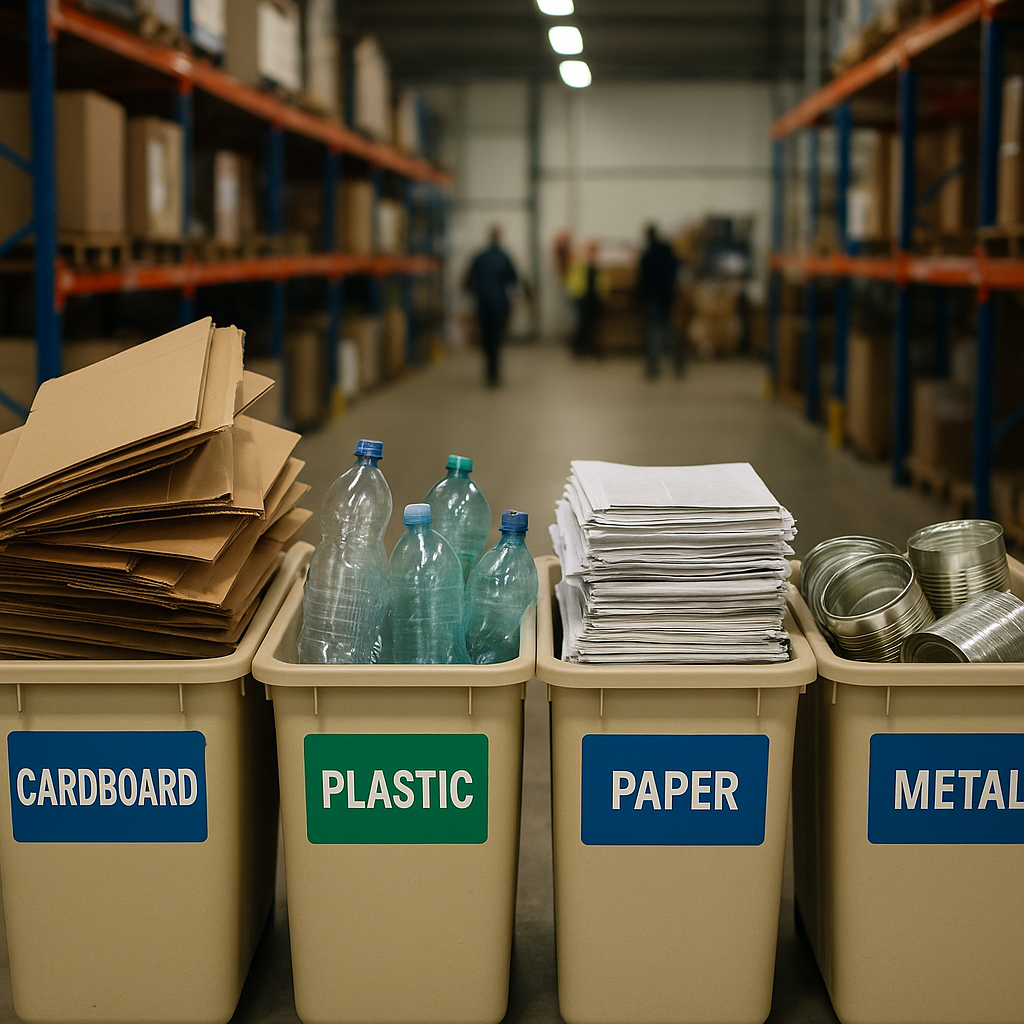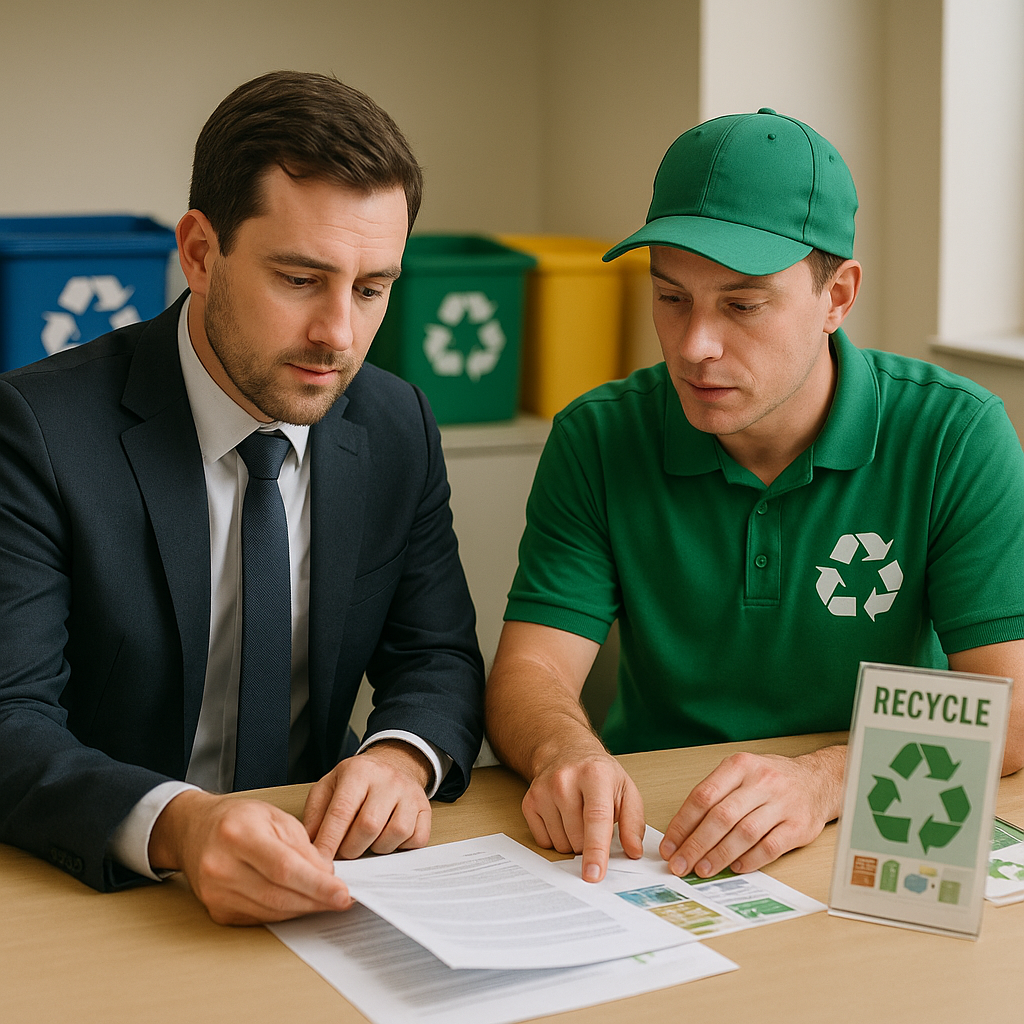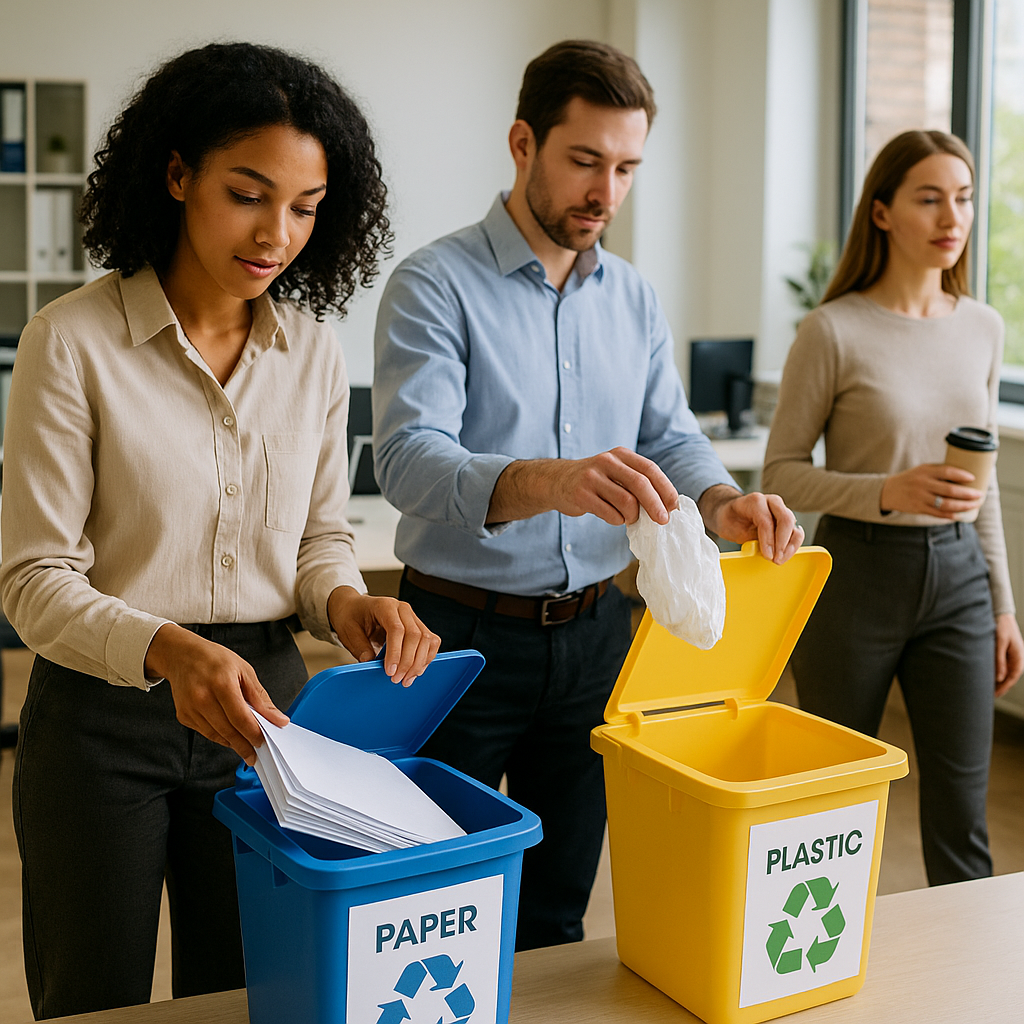5901 Botham Jean Blvd, Dallas, TX 75215
B2B Recycling Solutions: Exploring The Cost Savings, Compliance & ROI
September 4, 2025B2B recycling solutions offer comprehensive waste management services tailored for businesses to efficiently collect, sort, and process recyclable materials. These programs assist companies in diverting valuable resources from landfills and converting waste into reusable materials. The emphasis is on creating sustainable waste streams that benefit both business operations and the environment.
Businesses generate substantial amounts of recyclable materials daily, including cardboard packaging, office paper, plastics, electronics, food waste, and textiles. Without effective recycling systems, these materials end up in landfills, contributing to pollution and greenhouse gas emissions. B2B recycling mitigates this by capturing these materials for reprocessing.
The primary goals of B2B recycling are twofold: to significantly reduce waste sent to landfills, addressing the issue of limited disposal capacity in many regions, and to reintroduce valuable materials into the supply chain. This supports a circular economy where resources are continuously reused, creating new value streams for companies while minimizing their environmental impact.
What Types of Materials Can Businesses Recycle?

The commercial recycling sector has evolved significantly, enabling businesses to divert various materials from landfills. Recognizing these recyclable materials is essential for implementing effective waste management practices that benefit both your company and the environment.
The four main categories of commercial recyclable materials are paper and cardboard, plastics, glass, and metals. Each requires specific handling protocols to enhance recycling efficiency and reduce contamination.
Paper and Cardboard Recycling
Paper and cardboard make up a substantial portion of business waste. In the United States, paper constitutes approximately 23 percent of municipal solid waste each year—more than any other material. Thankfully, about 68 percent of paper used by Americans is recycled, making it one of the most successfully recycled materials.
For businesses, implementing a paper and cardboard recycling program is straightforward and impactful. Clearly labeled bins should be placed throughout the workplace, with smaller containers at individual desks and larger collection points in common areas. Cardboard boxes should be broken down to save space, and contaminants like plastic tape should be removed before recycling.
Plastic Recycling
Businesses generate a substantial amount of plastic waste through packaging, shipping materials, and operations. While more challenging than paper recycling, plastic recycling is increasingly accessible for businesses.
Understanding plastic recycling codes is crucial for effective sorting. The commonly recycled plastics in commercial settings include:
- PET (Code #1): Water bottles, beverage containers, and food packaging
- HDPE (Code #2): Milk jugs, detergent bottles, and plastic drums
- LDPE (Code #4): Shrink wrap, plastic bags, and flexible packaging
- PP (Code #5): Containers, caps, and industrial packaging
Despite its potential, only 8.7 percent of plastics were recycled in 2018, highlighting the opportunity for businesses to enhance their recycling efforts.
Metal and Glass Recycling
Metal and glass are among the most versatile recyclable materials in commercial waste. Their unique properties allow them to be recycled indefinitely without losing quality, making them valuable for sustainability efforts.
For metal recycling, businesses should separate ferrous metals (containing iron) from non-ferrous metals (such as aluminum and copper). A simple magnet test can help: ferrous metals stick to magnets, while non-ferrous do not. Metal recycling conserves resources significantly—recycling aluminum uses 95% less energy than producing it from raw materials.
Glass recycling mainly includes bottles, jars, and containers. Like metal, glass can be endlessly recycled without losing purity. Effective glass recycling involves removing non-glass components like caps or food residue.
E-Waste and Specialized Materials
Beyond core recyclables, businesses can also recycle electronic waste (e-waste) like computers, phones, and other devices. In 2018, about 38.5% of consumer electronics were recycled. Although it requires specialized handling, many manufacturers and retailers offer take-back programs.
Businesses may also generate industry-specific recyclable materials:
- Batteries and light bulbs: Require special handling but are recyclable
- Textiles: Fabric scraps and uniforms are often recyclable
- Agricultural byproducts: Many farming and food production wastes can be composted or repurposed
- Industrial materials: Specialized items like scrap metal, rubber, and certain chemicals
Working with professional waste management providers enables businesses to recycle a broader range of materials through solutions tailored to specific industry waste streams.
| Material | Recycling Rate (%) |
|---|---|
| Paper | 65-69% |
| Corrugated Board | 71-76% |
| Aluminum Beverage Cans | 45% |
| Steel Cans | 58% |
| Plastics | 8.7% |
| Glass | 31% |
By correctly identifying and sorting these recyclable materials, businesses can greatly reduce their environmental impact while potentially lowering waste disposal costs. Success in recycling relies on clear protocols, staff training, and collaboration with knowledgeable recycling service providers.
How Do B2B Recycling Services Benefit Companies?

B2B recycling services provide substantial financial benefits to companies by reducing waste disposal costs. As landfill fees rise, comprehensive recycling programs offer immediate savings. For example, recycling bags generally cost less than general waste bags, resulting in direct operational savings. A UK manufacturing company implementing cardboard compacting equipment reduced collection frequency by 50%, saving thousands of pounds annually on waste management expenses.
Financial advantages extend beyond lower disposal costs. Companies can generate new revenue streams by selling recyclable materials like scrap metal, certain plastics, and paper to recyclers. A UK tech firm earned over £10,000 annually by selling recyclable electronic components instead of paying for disposal. Additionally, manufacturing with recycled materials generally requires less energy than using virgin resources, with aluminum production from recycled materials saving up to 92% of the energy needed compared to raw ore processing.
B2B recycling services help companies meet increasingly stringent regulatory requirements. The UK government has implemented extensive regulations mandating proper waste management for businesses. The Waste Regulations 2011 introduced the waste hierarchy in UK law, requiring businesses to prioritize waste prevention, reuse, and recycling over disposal methods. From March 31, 2025, businesses with ten or more full-time employees must separate waste into specific streams: general waste, food waste, paper and cardboard, and dry mixed recycling.
Non-compliance with recycling regulations carries serious consequences, including significant financial penalties scaled to the violation severity. Businesses may face fines ranging from £110 to £5,000 or more, with possible prosecution in severe cases. The reputational damage from environmental non-compliance can be long-lasting and erode customer trust, potentially disrupting operations if local authorities restrict waste collection services for non-compliant businesses.
Beyond regulatory compliance, B2B recycling services significantly enhance brand reputation and corporate social responsibility efforts. Research consistently shows that environmentally conscious brands enjoy higher trust and loyalty from their customer base. When staff participate in designing and implementing recycling initiatives, it fosters team-building and a shared purpose. Companies often report improved morale and reduced turnover after introducing comprehensive recycling programs.
Effective recycling practices can also improve a company’s standing with investors who prioritize environmental, social, and governance criteria. Companies demonstrating a commitment to sustainability through recycling programs often score higher on ESG evaluations, opening doors to new funding opportunities from sustainability-focused investors. For example, Unilever’s commitment to becoming a zero-waste company has attracted significant ethical investment, contributing substantially to their positive brand reputation.
What Should Companies Look for in a B2B Recycling Partner?

Selecting the right B2B recycling partner is a critical business decision that impacts operational efficiency, regulatory compliance, and sustainability goals. The most effective recycling partnerships deliver value while ensuring responsible practices. Here’s what companies should prioritize when evaluating potential recycling service providers.
Experience and Industry Expertise
Look for recycling partners with proven experience in your specific industry. Partners who understand your sector’s unique challenges can provide more effective solutions. Review their track record working with similar businesses and ask for references from other industrial clients.
A recycling partner with deep industry knowledge can anticipate your needs and offer practical advice beyond basic waste collection. They should demonstrate an understanding of compliance requirements specific to your operations.
Reputation is significant in this field. Check online reviews and speak with existing clients to gauge their satisfaction with the service provider’s reliability, professionalism, and problem-solving skills.
Range of Accepted Materials
Even if your current recycling needs focus on common materials like paper and cardboard, choose a partner capable of handling a diverse range of recyclables. This approach ensures compliance as your waste streams evolve or as regulations change.
The ideal partner should accept materials relevant to your industry, including specialized waste streams that may require unique processing techniques. This capability eliminates the need for multiple vendors and simplifies waste management processes.
Partners who can manage everything from common recyclables to challenging materials demonstrate a commitment to complete waste diversion. This capability is particularly valuable for businesses subject to waste bans or strict regulatory requirements.
Customized Solutions and Flexibility
Every business has unique recycling needs that change over time. Your recycling partner should offer customized solutions that align with your specific requirements rather than one-size-fits-all approaches.
Service flexibility is essential for accommodating fluctuations in your waste generation. The right partner will adapt their pickup schedules and equipment options to match your evolving needs, whether you’re scaling up or experiencing seasonal variations in waste production.
Look for providers who conduct thorough waste audits to understand your specific waste streams before proposing solutions. This analysis leads to more efficient recycling processes tailored to your operations.
Technology and Innovation
Modern recycling partners leverage advanced technology throughout their operations. This includes tracking systems that monitor waste collection and processing, providing transparency and helping you measure your recycling efforts more effectively.
Equipment offerings are another key consideration. Quality partners provide on-site equipment such as balers, compactors, or specialized containers that optimize your recycling process. They should also offer training on how to use this equipment properly.
Innovation distinguishes leading recyclers. Partners who continuously improve their processes can recycle more material with greater efficiency. This commitment to innovation ensures your partnership remains beneficial as new recycling methods emerge.
Transparency and Reporting
Trust is fundamental in recycling partnerships. Your provider should maintain complete transparency about how they handle your materials after collection. Many reputable recyclers invite clients to tour their facilities to observe their processes firsthand.
Comprehensive reporting is essential for tracking your sustainability progress. Look for partners who provide detailed documentation of materials collected, recycling rates, and environmental impact metrics. These reports should help you measure progress toward your sustainability goals.
Clear pricing structures with no hidden fees demonstrate integrity. Your recycling partner should provide straightforward explanations of costs and potential revenue from valuable recyclables like scrap metal.
Certifications and Compliance
Industry certifications serve as evidence of a recycler’s commitment to responsible practices. Partners should hold relevant certifications such as R2 (Responsible Recycling), e-Stewards, or ISO 14001, depending on the materials you need recycled.
Data security is crucial when recycling electronics or confidential materials. Certified partners implement rigorous protocols to protect sensitive information, including secure transportation, controlled facility access, and proper data destruction methods.
Environmental compliance is non-negotiable. Your recycling partner should demonstrate strict adherence to environmental regulations and help ensure your business remains compliant with relevant waste management laws.
Education and Support
The best recycling partners go beyond basic services to educate your team about recycling best practices. This support helps maximize program effectiveness and ensures proper material separation at the source.
Look for providers willing to help design efficient in-house recycling processes. Their expertise can significantly improve your waste diversion rates and reduce contamination issues that undermine recycling efforts.
Ongoing communication is vital for program success. Your partner should be readily available to address questions, resolve issues, and provide updates about changing regulations or recycling technologies.
How Can Businesses Implement Effective Recycling Programs?

Implementing an effective B2B recycling program requires strategic planning and commitment. A structured approach ensures regulatory compliance and generates significant cost savings through reduced waste disposal fees. To develop a successful recycling program, businesses should follow these key steps.
Conduct a Comprehensive Waste Audit
Prior to launching any recycling initiative, businesses must understand the waste they generate. A thorough waste audit involves examining trash containers throughout the facility and documenting the types and quantities of materials discarded. This process reveals which materials can be diverted from landfills and identifies specific opportunities for waste reduction.
During the audit, companies should document where waste is generated, how much is produced in different departments, and what percentage could potentially be recycled. The findings establish a baseline for measuring future improvements and help in setting realistic recycling goals.
A waste audit also helps businesses understand their current waste management costs. Reviewing waste hauling bills can highlight potential savings through increased recycling and reduced trash service.
Partner with the Right Recycling Service Provider
Finding a suitable recycling partner is crucial for program success. Businesses should research local recycling service providers to find one that handles the specific materials identified in the waste audit. When evaluating potential partners, consider their collection schedules, container options, and pricing structures.
When contacting recycling service providers, inquire about their processing capabilities, contamination policies, and whether they offer any educational resources. Some providers offer waste stream analysis and program design assistance as part of their services, which can be valuable for businesses new to recycling.
Consider requesting quotes from multiple haulers to compare pricing and services. A resource management contract focusing on service rather than volume can often lead to better overall value and program performance.
Develop a Tailored Collection System
An effective collection system makes recycling convenient for employees. Place recycling bins strategically throughout the workplace, especially in high-waste-generation areas such as break rooms, copy centers, and production facilities. Every trash can should have a corresponding recycling bin to make proper disposal easy.
The collection system should include clearly labeled containers that help users quickly identify where to place different materials. Color-coding bins (typically blue for recycling and black or gray for trash) creates visual cues that reinforce proper sorting habits.
For outdoor collection areas, ensure all dumpsters are properly labeled and positioned to make recycling as convenient as trash disposal. Place recycling dumpsters in easily accessible locations to encourage their use.
Implement Clear Signage and Education
Employee education is essential for a successful recycling program. Even the best-designed system will fail if staff don’t understand what can be recycled or how to sort materials properly.
Create clear, visually appealing signage that shows exactly what goes into each bin. Use pictures alongside text to make instructions immediately understandable. Place these signs at eye level near collection points and on bin lids for visibility during disposal.
Hold training sessions to explain the recycling program to all employees. These sessions should cover program goals, what materials are recyclable, and proper sorting techniques. Include custodial staff in these sessions, as they play a key role in maintaining the program.
Establish a Green Team
Creating a dedicated team of recycling champions helps maintain program momentum. This team can monitor bin placement, address issues as they arise, and continue to educate coworkers about proper recycling practices.
The green team should include representatives from different departments to ensure company-wide engagement. They can help identify department-specific recycling opportunities and address challenges unique to different work areas.
Regular green team meetings provide opportunities to discuss program progress, brainstorm solutions to problems, and plan education campaigns. This team also serves as a resource for employees who have questions about the recycling program.
Monitor Performance and Track Results
Ongoing monitoring is essential for maintaining an effective recycling program. Regularly check recycling bins for contamination and track recycling rates to measure progress toward goals. Work with your recycling service provider to obtain data on the volume and types of materials collected.
Tracking key metrics such as diversion rates, contamination levels, and cost savings demonstrates the program’s value to management. These metrics can also identify areas for improvement and inform adjustments to the program.
Consider conducting follow-up waste audits periodically to assess changes in waste composition and identify new recycling opportunities. This continuous improvement approach ensures the program remains effective as business operations evolve.
Communicate Successes and Celebrate Progress
Sharing program achievements helps maintain employee engagement and organizational commitment. Regular updates on recycling rates, landfill diversion, and cost savings remind staff that their efforts make a difference.
Use company newsletters, email updates, or bulletin boards to highlight recycling successes. Consider creating friendly competitions between departments to boost participation rates.
Recognize individuals or teams that make significant contributions to the recycling program. Public acknowledgment of these efforts reinforces the importance of recycling and encourages continued participation.
By following these steps and maintaining consistent focus on program goals, businesses can develop recycling systems that deliver environmental benefits while reducing waste management costs. The key to long-term success lies in making recycling convenient, providing clear education, and continuously monitoring and improving the program over time.
Conclusion: Embracing B2B Recycling for a Sustainable Future

B2B recycling solutions have become a key strategy for businesses aiming to boost their sustainability credentials while gaining practical operational benefits. Implementing effective recycling programs allows companies to significantly reduce their environmental impact by diverting valuable materials from landfills and minimizing resource extraction.
The case for B2B recycling extends beyond environmental responsibility. Companies that adopt circular economy principles through comprehensive recycling initiatives often achieve substantial cost savings through lower waste disposal fees and new revenue streams from recovered materials. These practices enhance supply chain resilience, improve brand reputation, and position organizations favorably in a market increasingly focused on environmental concerns.
For your organization’s recycling needs, contact Okon Recycling at 214-717-4083. Our team can help develop customized recycling solutions that align with your sustainability goals and business requirements.
